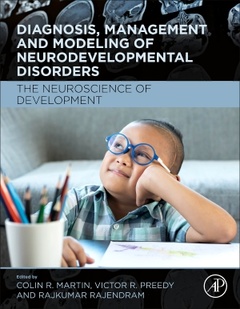Diagnosis, Management and Modeling of Neurodevelopmental Disorders The Neuroscience of Development
Coordonnateurs : R Martin Colin, Preedy Victor R, Rajendram Rajkumar

Diagnosis, Management and Modeling of Neurodevelopmental Disorders: The Neuroscience of Development is a comprehensive reference on the diagnosis and management of neurodevelopment and associated disorders. The book discusses the mechanisms underlying neurological development and provides readers with a detailed introduction to the neural connections and complexities in biological circuitries, as well as the interactions between genetics, epigenetics and other micro-environmental processes. In addition, the book also examines the pharmacological and non-pharmacological interventions of development-related conditions.
I. Introductory Chapters: Setting the Scene for the Neuroscience of Development 1. The brain and its structures: An overview 2. Neural tube defects: Embryonic origin, clinical features and cell survival equilibrium impact 3. Chemical substances affecting neurodevelopment 4. High-risk babies and Neurodevelopmental outcome 5. Genomic Imprinting and neurodevelopment 6. Insights from model systems: Alcohol, neurodevelopment and zebrafish 7. Early life nutrition and brain development: Maternal iodine nutrition and neurodevelopment 8. Endocrine Aspects of Development. Thyroid hormone actions in neurological processes during brain development
II. Impairments and Diseases 9. Pediatric brain tumors 10. Neurofibromatosis Type 1: From cellular phenotypes to human brain function 11. The role and development of neural crest cells 12. Spina Bifida: A Biopsychosocial Perspective 13. Diabetic ketoacidosis and neurodevelopment 14. Four-dimensional features of fetal brain: Applications to diabetes 15. Prenatally exposed to nicotine and neurodevelopment 16. Maternal methamphetamine and impact on the brain 17. Alcohol, cannabis and brain development 18. The Environmental Pollutant Trichloroethylene Disrupts Key Neural Pathways During Brain Development 19. Developmental neurotoxicity of the herbicide atrazine 20. Neurodevelopmental delays and in utero hyperemesis gravidarum 21. Neurodevelopment and Infantile Epileptic Encephalopathy-9 (EIEE9) 22. Neurodevelopment in Turner syndrome 23. Very preterm children and the impact on neurodevelopmental outcomes 24. Linking congenital heart disease and brain functional connectivity in newborns 25. Brain Growth in Congenital Heart Disease from Prenatal Environment to Adulthood 26. Linking dopamine, amphetamine and neurodevelopment 27. Developmental coordination disorder
III. Biomarkers, Screening, Methods and Diagnosis 28. Neurodevelopment and the The Ages and Stages Questionnaire, third edition (ASQ-3) 29. Screening for Attention Deficit Hyperactivity Disorder in children 30. The Mini-Mental State Pediatric Examination screening tool: Italian perspectives 31. Predictors of neurodevelopment in preterm infants: From the neonatal intensive care unit into adulthood 32. The antenatal fetal neurodevelopmental test: Uses and applications
IV: Management and Treatments 33. Pain, evaluation and management in neurodevelopmental conditions 34. Use of levetiracetam: Features and applications to neonatal seizures 35. Quetiapine treatment in paediatric scenarios 36. Treatments with cannabinoids and brain development 37. Pediatric dystonia and deep brain stimulation 38. Use of repetitive transcranial magnetic stimulation in neurodevelopment: A narrative review 39. Cognitive behavioral therapy in children with anxiety disorders 40. Cognitive behavioral therapy for anxiety in children with autism spectrum disorder 41. Nutritional treatment in fetal alcohol spectrum disorder 42. Nurturing the Developing Brain to Reduce Neurological Delay 43. Normalizing perinatal neurological development via intervention
V. Models and Modelling 44. Microplatforms as a Model for Neurological Conditions 45. Disease models in neurodevelopmental disorders 46. Endosulfan and impact on neurodevelopment: Modelling with zebrafish (Danio rerio) 47. Neurodevelopment of the zebrafish spinal serotonin system 48. Inbred mouse model of brain development and intestinal microbiota 49. The myelin mutant taiep rat as a model of developmental disorder 50. The MAM-E17 neurodevelopmental model of schizophrenia
VI. Resources 51. Research and recommended resources in the neuroscience of development
- Provides the most comprehensive coverage of the broad range of topics relating to the neuroscience of aging
- Features sections on the genetics that influences aging and diseases of aging
- Contains an abstract, key facts, a mini dictionary of terms, and summary points in each chapter
- Focuses on neurological diseases and conditions linked to aging, environmental factors and clinical recommendations
- Includes more than 500 illustrations and tables
Date de parution : 07-2021
Ouvrage de 624 p.
21.5x27.6 cm



